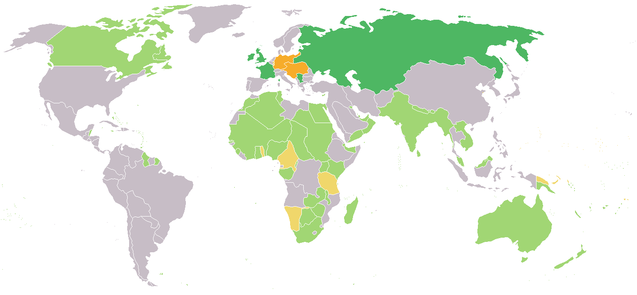Triple entente
The Triple Entente (short only: Entente , from French entente [ ɑ̃.tɑ̃t ] "understanding", "agreement", "arrangement") was an informal alliance between the United Kingdom , France and Russia . It emerged on the basis of the Franco-Russian alliance of 1894. Great Britain (then under Prime Minister Arthur Balfour ) and France (then under President Émile Loubet ) settled their opposing interests in 1904 ( entente cordiale ); Great Britain (then under Prime Minister Henry Campbell-Bannerman ) and the Russian Empire (under Nicholas II ) signed the Treaty of Saint Petersburg in 1907 .
Since there were no further binding obligations apart from the Franco-Russian alliance, the effectiveness of the Triple Entente was initially rather limited. Rather, informal military agreements created the specter of " encirclement ", which influenced political developments in Germany up to the First World War .
The importance of the Triple Entente as a decisive coalition in the First World War is anchored in history. Their opponents were the Central Powers , of which the German Empire and the Habsburg Monarchy Austria-Hungary were the most important allies. The military alliance of the Triple Entente was based on the Pact of London , which was concluded on September 5, 1914 (about a month after the start of the war).
Before entering the war, the Triple Entente was a defensive alliance in foreign policy, like the Triple Alliance .
The Entente and its allies in the First World War
Triple entente
Triple Entente: United Kingdom, France and Russia (with possessions)
Triple Alliance : German Empire, Austria-Hungary and Italy
Triple Entente and Serbia and Triple Entente possessions
Central Powers and their possessions
- France
- United Kingdom of Great Britain and Ireland
- Russian Empire or Russia (until the October Revolution 1917)
Allied powers (selection)
- Kingdom of Serbia
- Kingdom of Montenegro
- Belgium
- Japan
- Kingdom of Italy (from 1915)
- Portugal (from 1916)
- Kingdom of Romania (from August 1916)
- Kingdom of Greece (from 1917)
- China (from 1917)
- Siam (from 1917)
Other allies of the Entente see party to the First World War .
Associated Power
- United States of America (USA)
The USA (declaration of war on Germany on April 6, 1917) attached importance to being only an associated power . President Woodrow Wilson wanted to establish a special role for the USA, which should potentially enable him to act as a mediator. This role was also reflected in the fact that the USA initially only declared war on Germany, not Germany's allies. It was not until December 7, 1917, after the collapse of the Italian front on the Isonzo, that war was declared on Austria-Hungary .
Entente and Russia after the October Revolution
After the October Revolution in 1917, an armistice was signed between Germany and Soviet Russia in December 1917 and the Brest-Litovsk Peace Treaty on March 3, 1918 . This ended the First World War on the Eastern Front and the situation changed: Allies became enemies. British troops landed on Russian territory just three days later. This was followed by further invasions by French, American, Japanese and Greek troops in various regions of the former Russia to support the White Army in the restoration and to maintain or expand spheres of influence .
More important for the continuation of the Russian civil war , however, were the massive supplies and aid provided by the Entente to the white troops in Siberia and southern Russia (Ukraine). Winston Churchill wrote in a memorandum dated September 15, 1919 that England had spent the enormous sum of 100 million pounds on the white troops in Russia in 1919 and France between 30 and 40 million pounds in the same year, enormous sums by the value at the time. Military support continued until 1922 and ended in debacle. It contributed to bringing the two pariah states Germany and Soviet Russia closer together after the end of the war ( Treaty of Rapallo 1922).
See also: Intervention of the Entente Powers in the Russian Civil War
See also
- Little Entente (alliance after the First World War between Czechoslovakia , Kingdom of Yugoslavia and Kingdom of Romania ; existed between 1920 and 1938)
literature
- Edward E. McCullough: How the First World War Began: The Triple Entente and the Coming of the Great War of 1914-1918. Black Rose Press, Montreal 1998, ISBN 1-55164-141-0 .
- Fiona K. Tomaszewski: A Great Russia: Russia and the Triple Entente, 1905-1914. Greenwood Publishing, 2002, ISBN 0-275-97366-2 .
- Patricia A. Weitsman: Dangerous Alliances: Proponents of Peace, Weapons of War. Stanford University Press, 2004, ISBN 978-0-8047-4866-7 .
Individual evidence
- ^ Adolf Gasser : Prussian military spirit and the unleashing of war in 1914. Basel / Frankfurt a. M. 1985.
- ↑ The Kingdom of Italy belonged to the Triple Alliance with Germany and Austria-Hungary until 1915, but did not enter the war in 1914. Instead, Italy declared war on its former ally Austria-Hungary in 1915.
- ↑ Alexander Sedlmaier: Deutschlandbilder und Deutschlandpolitik: Studies for the Wilson Administration (1913-1921) (Volume 51 of HMRG supplements, historical communications on behalf of the Ranke Society). 2003, ISBN 978-3-515-08124-5 , pp. 75-76 ( online ).
- ^ Winston Churchill: The World Crisis. The aftermath . London 1929, Volume 4, p. 256 ( online quote ).


